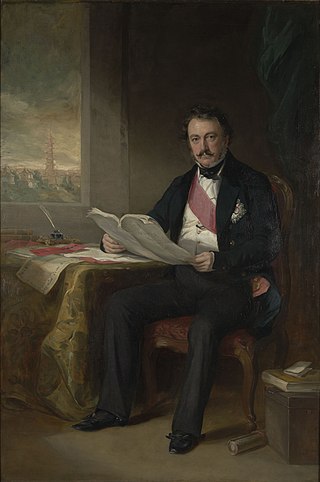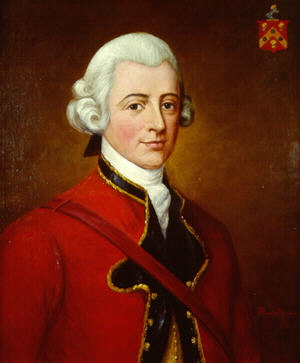
Lieutenant-General Sir Henry Pottinger, 1st Baronet was an Anglo-Irish soldier and colonial administrator who became the first Governor of Hong Kong.

Sir George William Des Vœux was a British colonial administrator who served as governor of Fiji (1880–1885), Newfoundland (1886–1887), and Hong Kong (1887–1891).

The Eden Baronetcy, of West Auckland in the County of Durham, and the Eden Baronetcy, of Maryland in North America, are two titles in the Baronetage of England and Baronetage of Great Britain respectively that have been united under a single holder since 1844.
Des Vœux or De Voeux may refer to:
There have been four baronetcies created for people with the surname Hoare, one in the Baronetage of Ireland, one in the Baronetage of Great Britain and two in the Baronetage of the United Kingdom. The second holder of the third creation was raised to the peerage as Viscount Templewood in 1944.
There have been six baronetcies created for persons with the surname Brooke, one in the Baronetage of England, one in the Baronetage of Ireland and four in the Baronetage of the United Kingdom. As of 2015 four of the creations are extant, though one has been subsumed into a peerage.

The Shuckburgh Baronetcy, of Shuckburgh in the County of Warwick, is a title in the Baronetage of England. It was created on 25 June 1660 for John Shuckburgh, the eldest son of Sir Richard Shuckburgh, (1594–1656) Member of Parliament for Warwickshire and a supporter of the Royalist cause in the Civil War, who was knighted before the Battle of Edgehill by Charles I.
There have been two baronetcies created for persons with the surname Carden, one in the Baronetage of Ireland and one in the Baronetage of the United Kingdom. Both creations are extant as of 2010.

The Worsley family is an English family that is derived from Sir Elias de Workesley, a Norman knight who was a youth at the time of the Norman conquest. He later accompanied Duke Robert II of Normandy on the First Crusade and was buried at Rhodes.
General Sir John "Black Jack" Slade, 1st Baronet, served as a general officer in the British Army during the Peninsular War. Slade was praised in official reports, including by Arthur Wellesley, 1st Duke of Wellington, who also voiced some criticisms of him privately. Slade received an Army Gold Medal, and was honoured three times with the thanks of Parliament. Slade's descendants include two admirals, namely son Sir Adolphus Slade and grandson Sir Edmond Slade. Despite achieving high rank during and after active soldiering, Slade was criticised as a general of cavalry by some contemporaries and historians.
The Diamond Jubilee Honours for the British Empire were announced on 22 June 1897 to celebrate the Diamond Jubilee of Queen Victoria on 20 June 1897.
The High Sheriff of County Kilkenny was the British Crown's judicial representative in County Kilkenny, Ireland from the 16th century until 1922, when the office was abolished in the new Free State and replaced by the office of Kilkenny County Sheriff. The sheriff had judicial, electoral, ceremonial and administrative functions and executed High Court Writs. In 1908, an Order in Council made the Lord-Lieutenant the Sovereign's prime representative in a county and reduced the High Sheriff's precedence. However, the sheriff retained his responsibilities for the preservation of law and order in the county. The usual procedure for appointing the sheriff from 1660 onwards was that three persons were nominated at the beginning of each year from the county and the Lord Lieutenant then appointed his choice as High Sheriff for the remainder of the year. Often the other nominees were appointed as under-sheriffs. Sometimes a sheriff did not fulfil his entire term through death or other event and another sheriff was then appointed for the remainder of the year. The dates given hereunder are the dates of appointment. All addresses are in County Kilkenny unless stated otherwise.
The Sheriff of County Dublin was the Sovereign's judicial representative in County Dublin. Initially, an office for a lifetime, assigned by the Sovereign, the Sheriff became an annual appointment following the Provisions of Oxford in 1258. The first recorded Sheriff was Ralph Eure, appointed in that year. The next recorded Sheriff was Sir David de Offington, who was Sheriff in 1282. Besides his judicial importance, the sheriff had ceremonial and administrative functions and executed High Court Writs.
The 1902 Birthday Honours were announced on 10 November 1902, to celebrate the birthday of Edward VII the previous day. The list included appointments to various orders and honours of the United Kingdom and the British Empire.
The 1902 Coronation Honours were announced on 26 June 1902, the date originally set for the coronation of King Edward VII. The coronation was postponed because the King had been taken ill two days before, but he ordered that the honours list should be published on that day anyway.
The 1893 Birthday Honours were appointments by Queen Victoria to various orders and honours to reward and highlight good works by citizens of the British Empire. The appointments were made to celebrate the official birthday of The Queen, and were published in the London Gazette on 2 June 1893 and in The Times on 3 June 1893.
The 1877 Birthday Honours were appointments by Queen Victoria to various orders and honours to reward and highlight good works by citizens of the British Empire. The appointments were made to celebrate the official birthday of the Queen, and were published in The London Gazette on 30 May and 2 June 1877.
Sir Charles Phillip Vinchon Des Voeux, 1st Baronet was an Irish politician.
Charles Frederick Des Voeux was an Irish officer in the British Royal Navy. He served as mate aboard HMS Erebus during the 1845 Franklin Expedition which sought to chart the Canadian Arctic, including the Northwest Passage, and make scientific observations. All personnel of the expedition, including Des Voeux, died in what is now Nunavut, Canada in uncertain circumstances. He and Graham Gore signed and deposited the Victory Point Record, one of the only official communications of the expedition yet found.





